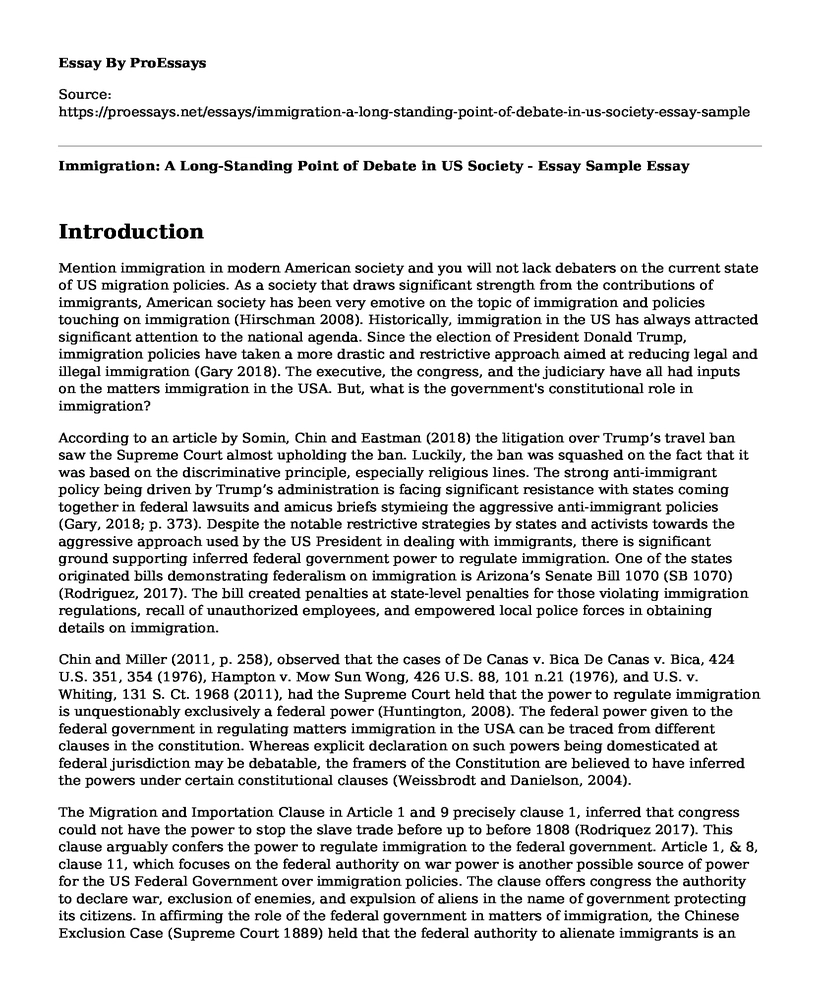Introduction
Mention immigration in modern American society and you will not lack debaters on the current state of US migration policies. As a society that draws significant strength from the contributions of immigrants, American society has been very emotive on the topic of immigration and policies touching on immigration (Hirschman 2008). Historically, immigration in the US has always attracted significant attention to the national agenda. Since the election of President Donald Trump, immigration policies have taken a more drastic and restrictive approach aimed at reducing legal and illegal immigration (Gary 2018). The executive, the congress, and the judiciary have all had inputs on the matters immigration in the USA. But, what is the government's constitutional role in immigration?
According to an article by Somin, Chin and Eastman (2018) the litigation over Trump’s travel ban saw the Supreme Court almost upholding the ban. Luckily, the ban was squashed on the fact that it was based on the discriminative principle, especially religious lines. The strong anti-immigrant policy being driven by Trump’s administration is facing significant resistance with states coming together in federal lawsuits and amicus briefs stymieing the aggressive anti-immigrant policies (Gary, 2018; p. 373). Despite the notable restrictive strategies by states and activists towards the aggressive approach used by the US President in dealing with immigrants, there is significant ground supporting inferred federal government power to regulate immigration. One of the states originated bills demonstrating federalism on immigration is Arizona’s Senate Bill 1070 (SB 1070) (Rodriguez, 2017). The bill created penalties at state-level penalties for those violating immigration regulations, recall of unauthorized employees, and empowered local police forces in obtaining details on immigration.
Chin and Miller (2011, p. 258), observed that the cases of De Canas v. Bica De Canas v. Bica, 424 U.S. 351, 354 (1976), Hampton v. Mow Sun Wong, 426 U.S. 88, 101 n.21 (1976), and U.S. v. Whiting, 131 S. Ct. 1968 (2011), had the Supreme Court held that the power to regulate immigration is unquestionably exclusively a federal power (Huntington, 2008). The federal power given to the federal government in regulating matters immigration in the USA can be traced from different clauses in the constitution. Whereas explicit declaration on such powers being domesticated at federal jurisdiction may be debatable, the framers of the Constitution are believed to have inferred the powers under certain constitutional clauses (Weissbrodt and Danielson, 2004).
The Migration and Importation Clause in Article 1 and 9 precisely clause 1, inferred that congress could not have the power to stop the slave trade before up to before 1808 (Rodriquez 2017). This clause arguably confers the power to regulate immigration to the federal government. Article 1, & 8, clause 11, which focuses on the federal authority on war power is another possible source of power for the US Federal Government over immigration policies. The clause offers congress the authority to declare war, exclusion of enemies, and expulsion of aliens in the name of government protecting its citizens. In affirming the role of the federal government in matters of immigration, the Chinese Exclusion Case (Supreme Court 1889) held that the federal authority to alienate immigrants is an incident of national sovereignty (Weissbrodt and Danielson, 2004).
Conclusion
In conclusion, the federal government enjoys a dominant control over the regulation of immigration policies in the USA. However, this monopoly also is under strict checks and balances to downplay a possibility of constitutional violations. Federalism offers the states and local government involvement in the debates on immigration policy in two critical angles, enforcement and integration federalism. The enforcement aspect of adopting federal immigration policies allows states and locals to assist or resist such policies, while the integration-federalism encourages the spirit of promoting ease acculturation and assisting immigrants.
Work Cited
Huntington, Clare. “Immigration and the Constitution: The Constitutional Dimension of Immigration Federalism.” The Fordham Law Archive of Scholarship and History. vol. 61, 787 (2008). Web
Gary Reich. “Hitting a Wall? The Trump Administration Meets Immigration Federalism” The Journal of Federalism, vol.48, no. 3 (2018); 372–395. Web
Hirschman, Charles. “Immigration to the United States: Recent Trends and Future Prospects.” Malaysian Journal of Economic Studies. vol. 51, no 1 (2014): 69-85. Web
Rodriguez, Cristina. “Enforcement, Integration and the Future of Immigration Federalism.” Journal on Migration and Human Security, vol.5, no. 2 (2017); 509-540. Web
Somin, Ilya; Chin, Gabriel; and Eastman, John. “Does the Constitution Give the Federal Government Power over Immigration?” CATO Unbound: A Journal of Debate, 2018. Web
Weissbroadt, David and Danielson, Laura. “Chapter 2: The Source and Scope of the Federal Power to Regulate Immigration and Naturalization.” University of Minnesota Human Rights Library. 2004. Web
Cite this page
Immigration: A Long-Standing Point of Debate in US Society - Essay Sample. (2023, Aug 16). Retrieved from https://proessays.net/essays/immigration-a-long-standing-point-of-debate-in-us-society-essay-sample
If you are the original author of this essay and no longer wish to have it published on the ProEssays website, please click below to request its removal:
- The Mask You Live In (2015) and the American Idea of Masculinity - Essay Sample
- Effects of World War I on Gender Relations Essay
- Ethics in Social Work Essay Example
- Parental Involvement and Students' Academic Achievement Paper Example
- Research Paper on Minority Education: Causes of Poor Performance in School
- Essay Example on Loss of Chinese Culture in US: Impacts of Cultural Imperialism
- Societal Shaping: Impact of System on Our Behaviour & Values - Essay Sample







